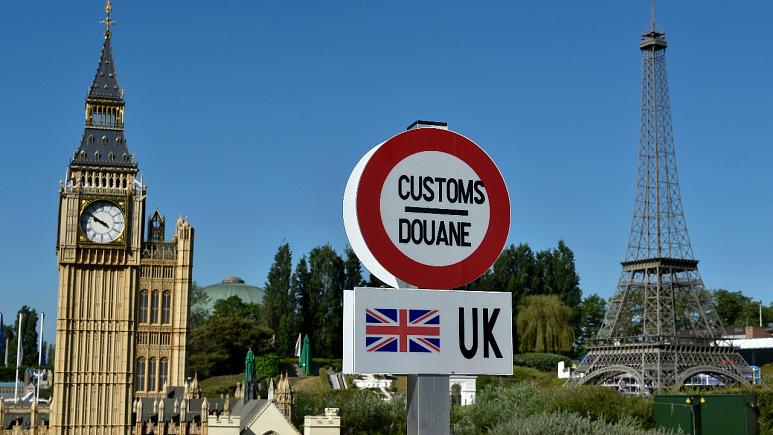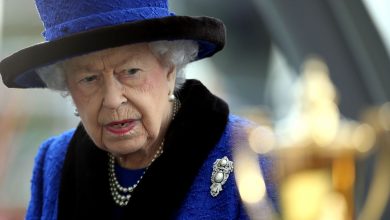Brexit: Britons warned of ‘thorough’ EU border checks after transition period ends

The European Commission has given a stark warning of the barriers that will go up between the EU and the UK when the post-Brexit transition period expires at the end of the year, whatever the outcome of negotiations on future relations.
Britons are told that they will be “subject to thorough checks” at borders when entering EU countries (apart from Ireland) and the Schengen area, as they will be “treated as third-country nationals”.
[contfnewc]
[contfnewc]
[contfnewc]
EU pet passports will no longer be valid for people travelling with animals from the UK to the EU, and UK driving licences will not be automatically recognised but will be subject to the approval of individual countries.
The EU ban on additional mobile roaming charges will no longer be guaranteed for travellers between the UK and the continent, leaving British and EU operators free to slap on extra fees.
UK nationals will not need visas to stay in EU countries for up to 90 days in any 180-day period, as long as they don’t work and Britain acts likewise for EU visitors. But passengers may no longer be protected by EU consumer rights when travelling between the EU and the UK depending on the mode of transport, the Commission says.
The warnings come in a document published on Thursday, which calls for awareness of “these broad and far-reaching changes, which will arise under any scenario” (in italics in the original text).
[contfnewc]
The Commission makes it clear that the changes are the consequence of the British government’s choices on future relations, and on the decision not to extend the transition period.
New barriers and red tape
The paper focuses on areas not covered by the talks, which it says it does not want to prejudge. The UK left the EU on January 31 but most arrangements from its membership remain in place throughout the transition period.
Post-Brexit negotiations continued in London this week after both sides agreed to intensify talks. “Regardless of the outcome, there will be inevitable changes on 1/1/21,” tweeted the EU’s chief negotiator Michel Barnier.
[contfnewc]
[contfnewc]
[contfnewc]
[contfnewc]
[contfnewc]
[contfnewc]
Even under “an ambitious partnership”, the future relationship will be very different from the UK’s membership of the EU Single Market and Customs Union, the document says. Britain’s exit from EU policies will “create barriers” to trade, movement across borders and exchanges.
“These inevitable disruptions will occur as of 1 January 2021 and risk compounding the pressure that businesses are already under due to the COVID-19 outbreak,” the paper says.
- Michel Barnier has responded to an appeal by the pro-Brexit European Research Group of Conservative MPs to respect UK independence. ERG Chairman Mark Francois wrote to the EU’s chief negotiator to demand that a future deal respect “the UK’s sovereignty, integrity and autonomy”, rejecting EU “demands” over competition, fisheries and the role of the European Court of Justice (ECJ).
- In his reply, Barnier insists on an agreement on fisheries as part of an overall deal. He also points out that the commitment to a “level playing field” and the ECJ’s role in interpreting EU law are part of the Political Declaration, approved by Boris Johnson and the House of Commons — including Francois himself — in ratifying the Brexit divorce deal.
In the EU paper, businesses are urged to prepare for the post-Brexit regime, involving customs formalities which on the EU side will lead to “increased administrative burdens” and “longer delivery times”.
“Rules of origin” regulations will have to be followed, which could result in customs duties being imposed even if a zero-tariff, zero-quota EU-UK trade deal is struck. VAT and excise duties will be due on goods entering the EU from the UK.
The UK’s exit from the Single Market means there will no longer be a single regulatory framework, but two separate legal structures. This means that for imports, companies on both sides will need to take steps to ensure products — which will be subject to checks and controls — comply with potentially different rules and standards.
[contfnewc]
[contfnewc]
[contfnewc]
[contfnewc]
UK services lose automatic right to operate in EU
UK authorisations for services — in the financial, transport, audiovisual and energy sectors — will no longer be valid in the EU from January. This means that UK service providers and professionals will have to demonstrate they comply with EU conditions imposed on foreign firms or individuals. Professional qualifications will no longer automatically be recognised.
Financial services will no longer benefit from “passports” enabling them to operate across the bloc, and their ability to do so may be subject to the relevant EU nation’s rules on third countries.
The Commission document also outlines the changes to be expected in the transport industry. Outside the Single Market, UK operators of air, rail and road transport services will no longer have automatic access. Instead this will depend on the outcome of post-Brexit negotiations.
There is a repeat of a recent warning that the UK will have to comply with EU rules on data protection in order for transfers of personal data to continue.
Finally, the Commission points out that from the end of the transition period, the UK will no longer benefit from several hundred international agreements struck by the EU with third countries in matters such as trade, mutual recognition, veterinary arrangements or aviation.
The British government has argued that the UK’s ability to strike its own trade deals is one of the advantages of Brexit. Official information updated in late June lists agreements with 20 countries or trading blocs ready to take effect in January 2021.
Changes ‘unavoidable’
All the above changes will happen in any case, regardless of whether an agreement on the future relationship is struck, the EU document says. It describes them as “unavoidable” and simply the consequence of the UK’s decision to leave the EU, its Single Market and Customs Union.
Failure to reach a deal “would lead to disruptions that would be more far-reaching”, it adds, as tariffs would be imposed on imports and exports between the EU and the UK.
After the latest talks in London on the post-Brexit relationship, EU and UK negotiators agreed to continue discussions in Brussels next week ahead of the next formal round later in July.
Both sides remain far apart on matters such as trade, fisheries, governance and fairness in competition.
[contfnewc]
[contfnewc]
[contfnewc]
[contfnewc]
[contfnewc]
[contfnewc]
[contfnewc]
[contfnewc]
[contfnewc]




